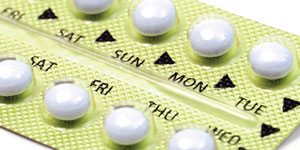Expecting
4 min Read
What to know about contraception after pregnancy

October 7, 2014
Expecting
4 min Read

October 7, 2014


The exact amount of time varies from woman to woman, however, it may be as early as a couple weeks. The first few months after delivery your fertility will actually be increased, even if you have not had a period yet. Abstinence is recommended for most women until six weeks postpartum due to risk of infection and effect on healing, however, birth control should be initiated prior to becoming sexually active again to avoid unplanned pregnancy.
No. Many women ovulate while breastfeeding, even if they’re not menstruating. Since your periods are likely to be irregular or non-existent while breastfeeding, it makes it difficult to predict when you are ovulating. Birth control is recommended while breastfeeding if you are not trying to get pregnant.
It depends on which pill. If it is a combined estrogen and progesterone pill, it is usually not recommended. It will not harm your baby or taint your milk, but it will diminish your milk flow, making breastfeeding much harder and sometimes impossible. However, there is a progesterone-only birth control pill that is very safe while breastfeeding that will not affect your milk production. Speak with your physician about this option if you plan on breastfeeding.
There are a few different options depending on how certain you are that you are done conceiving. Intra-uterine devices (IUDs) are an excellent alternative to the pill for most women, including those that are either finished having children, are not yet sure, or who don’t plan on conceiving anytime soon. They are also good options for women who have contra-indications to the pill, or who are just looking for a low-maintenance method of birth control. IUDs are small T-shaped devices that are inserted into the cervix in a doctor’s office. There are two different kinds of IUDs: copper, and progesterone-only.
Copper IUDs contain no hormones and are often cheaper for women without a drug plan. However, one side effect of them is that they can sometimes cause irregular, more painful cycles.
Progesterone-only IUDs have the added benefit of diminishing menstrual flow over time which causes some women stop getting periods all together. They are more effective than the pill at preventing pregnancy and have less room for error (as you don’t have to remember to take something every day). Most IUDs can be left in for three to five years.
If you are absolutely certain that you do not want to conceive again, speak with your physician about sterilization. Women can have a tubal ligation and men can have a vasectomy. Although your partner may not like the idea of it, a vasectomy has less potential complications and a shorter recovery time than a tubal ligation. This is of course unless you are already scheduled for a c-section and plan the procedure at the same time.
You have your tubes tied while you are having a c-section, as long as you speak with your OB/GYN before the surgery and are certain that you understand the risks involved. Reversal of a tubal ligation can be attempted if desired, however, infertility is common.
Other options for combined hormone birth control (estrogen and progesterone) include the vaginal ring and the patch. Both are great options for women without any contraindications to estrogen, such as breastfeeding, a personal history of blood clots, smoking over the age of 35 and migraines with aura. Many women like these options as they don’t have to remember to take a pill every day. The Depo-Provera shot is another progesterone only option. Ask your physician about the potential risks including bone density loss, weight gain and delayed return of fertility after stopping. As discussed, an IUD is often an excellent choice for many women as well.
There are many options available for post-natal contraception. Speak with your healthcare provider about what’s best for your family.
Originally published in ParentsCanada Best Wishes, Fall 2014.